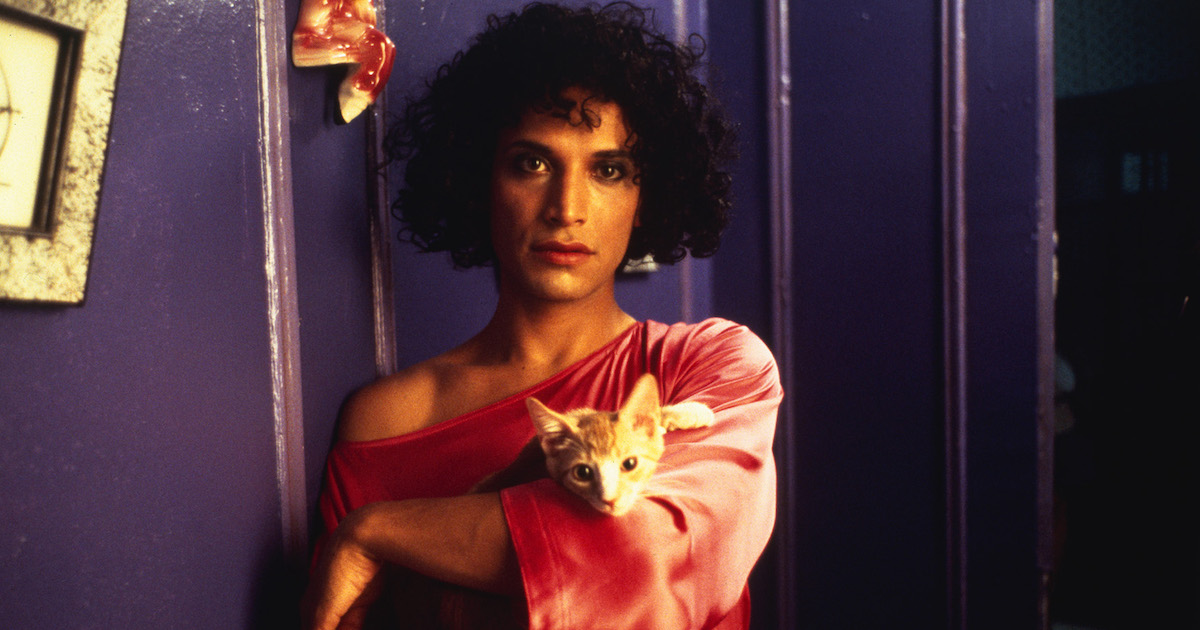Trans Representation in ‘I Like It Like That’
February 8, 2023 By Go BackThe last decade has seen a massive shift in LGBTQ+ representation. With this new understanding of what it means to tell queer stories comes an old question; What do we do with stories that we now recognize to be inaccurate and damaging? Do we file them away? Do we shrug and chalk it up to ‘the times’? Cinema has no shortage of problematic queer characters; what are we supposed to do with them?
This is a question you might ask yourself as you watch the opening scenes of Darnell Martin’s 1994 debut film, I Like It Like That, which follows the day-to-day life of Lisette Linarez (Lauren Valez) who must work to keep her family together after her husband, Chino, is caught stealing a stereo during a New York blackout. The film features a cast of vibrant and well-drawn characters that populate the Bronx neighborhood where Lisette resides. One such character is Lisette’s sister, Alexis, who serves as Lisette’s cheerleader and confidant. She also happens to be transgender.
Viewed with our modern lens, Alexis could easily be considered problematic. She’s portrayed by a cis-gender man (Jesse Borego), she has a terrible relationship with her parents that results in violence, and Lisette makes several references throughout the film to Alexis’ desire to get ‘the surgery’. In one particularly dark moment, her sister declares that ‘no amount of latex in the world will make Alexis ‘a mother’ – which simply isn’t true. Many transgender women experience motherhood. Were any of these things to appear in a film today, it would be heavily criticized – and rightfully so. We have a much better understanding now of why these character choices are cliche, inaccurate or downright dangerous.
With that said, there are some genuinely positive aspects to Alexis’ character, particularly given the time in which she was written. In 1994, transgender characters were few and far between. Those that did appear rarely occupied an important role in the story, and more often than not, appeared exclusively as punchlines. In 1993, just one year prior, The Crying Game had used a transgender character as a ‘shock reveal’ that caused her lover to vomit. Trans characters were often forced to suffer this kind of humiliation, shame and disgust at the hands of ‘normal’ cis-people.

In that context, Alexis’ portrayal could be interpreted as progressive. She doesn’t fall into the ‘deceptive villain’ trope. She’s confident, stable, self-sufficient and a reliable source of support and comfort for Lisette. She also has an expertise in femininity, offering advice to her cisgender sister, lending her bra inserts and teaching her how to walk like a model. Martin resists the temptation to have this advice go awry for comic effect, and instead allows Alexis to keep her sense of authority. Portraying a transgender woman as a source of comfort, security and genuine sisterhood was, for the time, pretty revolutionary.
Another important point to note; Alexis is never misgendered by her immediate community. No one knowingly refers to her by the wrong pronoun or gender. There are no throwaway jokes at the expense of her womanhood. Lisette uses male pronouns for her sister only when speaking to her parents, who don’t know about Alexis’ transition. Even Lisette’s reference to surgery (or the ‘latex’ comment) come in moments when Lisette is intentionally trying to hurt or guilt her sister, as though she knows that these things will do damage.
To me, the most disappointing part of this portrayal is the end. Lisette, in a moment of anger, suggests that Alexis take responsibility and come out to their parents. When Alexis does this, she is rejected and attacked. This moment exists to teach Lisette a lesson about parenting, not to further Alexis’ narrative. Once Lisette has learned her lesson, Alexis’ story is done. Later, during the credit sequence, we’re given a glimpse of her dancing with her sister, but we’re never told how she managed to recover from this awful incident. To see a positive character reduced to her trauma for a plot device, in my opinion, is more problematic than any off-hand comment about surgery. I would like to believe that Martin’s intent was to depict a real experience that some trans women go through, but I don’t think it was necessary or successful.
On the other hand, many of the same complaints can be made about Boys Don’t Cry, and that film, for all the heartbreak it causes, was really important to me as a teenager. I wanted representation so badly; I accepted a tragic portrayal over the absent one. How might a trans woman have felt then, watching Alexis? Would her less-than-inspiring ending be worth it?
In the spirit of the film itself, I’m tempted to follow Darnell Martin’s lead and suggest that complicated problems have complicated answers. Perhaps Alexis is neither a paragon nor a problem. She, like many characters in the movie, is a bold and intelligent attempt to depict a character that was underrepresented onscreen. She may not be perfect, but she also may be valuable to someone and that is worth considering. The fact that her representation is both revolutionary and deeply flawed points to the most extraordinary thing about her; that she got the chance to exist at all.
About Kyah Green
Kyah Green (they/them) is a screenwriter, narrative designer and actor from Toronto, Ontario. They have written for multiple award winning series including CBC’s ‘Sort Of’ and Season 4 of Corner Gas Animated (2018) for which they were nominated for a Canadian Screen Award for Best Writing in Animation.
Their feature film, ‘Neverman’, co-written by Rodrigo Barrisuo (Un Traductor), was selected for the Cannes Festival Residence, Inside-Out development program, Berlin Nipkow Programm, and finished as a semi-finalist for the Academy Nicholls Fellowship. Kyah identifies as non-binary transmasculine and is committed to diversity and representation in all of their work.
Find the next play times for I Like It Like That (1994) on Hollywood Suite.












 Follow us on Instagram
Follow us on Instagram